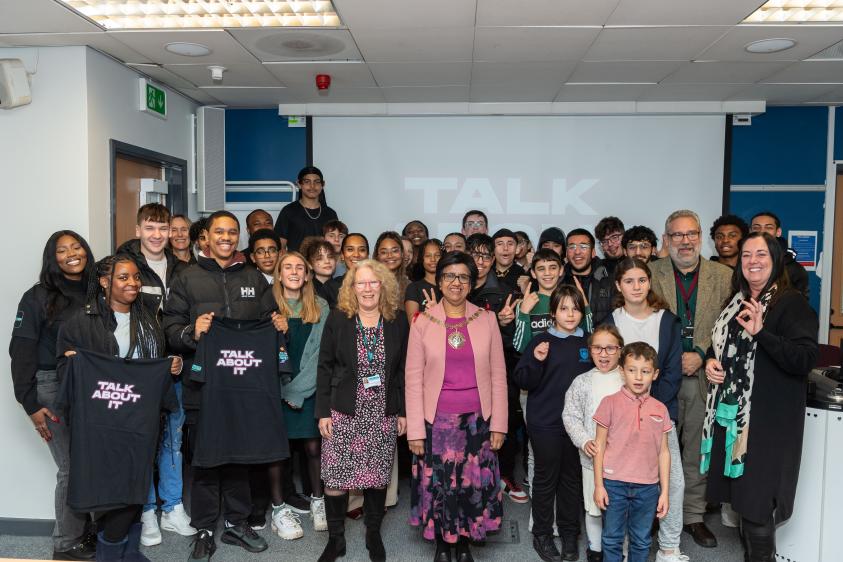
Launch of Talk About It: Don’t Hide Your Mind at Middlesex University
Barnet Council has launched a new mental health campaign aimed at helping the borough’s children and young people.
The campaign has been created with a panel of 14 to 21 year-olds, who drew on their own experiences to provide unique insight into the realities of the mental health issues affecting increasing numbers of Barnet’s young people.
Called ‘Talk About It: Don’t Hide Your Mind’, the campaign aims to destigmatise mental health and ensure young people ask for help, talk to someone they trust and direct them to the many support services available in Barnet.
The campaign was launched this week (15 November) at an event held at Middlesex University. The event featured the debut screening of a short film titled Talk About It: Don’t Hide Your Mind, which was written, produced and performed entirely by young Barnet residents. The film follows the lives of three characters – Rianna, Kofi and Kalli – and covers the mental health challenges each faces and their journeys to the help they need. The film will be screened in Finchley’s Vue Cinema for the next few weeks.
The growing number of children and young people experiencing poor mental health is one of our greatest challenges. The mental health and wellbeing of children and young people can affect them for the rest of their lives so supporting their mental health at an early stage can help them cope better with life’s setbacks now and in the future.
Speaking ahead of the film’s debut, one of the contributors Ayah, 23, said:
“The film is a powerful and captivating tribute to mental health which promises to make a profound impact in the lives of young children in Barnet and beyond.”
Cllr Pauline Coakley-Webb, Cabinet Member for Family Friendly Barnet, told the audience at the launch:
“Barnet Council is committed to supporting and improving the mental health and wellbeing of our children and young people here in our borough. We want our children and young people to know it is ok to ‘talk about it’, creating a cohesive and inclusive community where our children and young people feel confident, empowered, and enabled to share what they are feeling be that with friends, neighbours, communities, schools, or specialist services.”
The Talk About It campaign, along with the forthcoming Children and Young People’s Mental Health and Wellbeing Charter, supports the mental health of children and young people living in the borough to foster a culture of positive mental health and wellbeing*.
Watch Talk About It: Don’t Hide Your Mind: www.barnet.gov.uk/young-people/talk-about-it
-ENDS-
*BICS support young people’s mental health and wellbeing with free online resources hints and tips and a helpline on 020 8359 3130, available Monday to Friday from 9am to 5pm.
Visit Kooth.com for Free, Safe and Anonymous online counselling support for 11-25 year olds.
- Rates of probable mental health disorders have increased since 2017. In 2020 1 in 6 (16.0%) of children aged five to 16 were identified as having a probable mental health problem, an increase from 1 in 9 (10.8%) in 2017. The increase was evident in both boys and girls. (NHS Digital Survey 2021)
- The likelihood of a probable mental health disorder increased with age with a noticeable difference in gender for the older age group (17-22 years) – 27.2% of young woman and 13.3% of young men were identified as having a probable mental health disorder. (NHS Digital Survey 2021)
- One in three young people with a mental health condition gets access to NHS care and treatment (NHS Digital Survey 2021)
- 80% of young people with mental health needs agree that the Covid-19 pandemic has made their mental health worse. (NHS Digital Survey 2021)
- In 2018-19, 24% of 17-year-olds reported having self-harmed in the previous year, and seven per cent reported having self-harmed with suicidal intent at some point in their lives. 16% reported high levels of psychological distress (NCB and UCL research November 2020)
- Suicide was the leading cause of death for males and females aged between five to 34 in 2019 (ONS deaths registered in England and Wales 2019, Section 6)
- Nearly half of 17-19 year-olds with a diagnosable mental health disorder has self-harmed or attempted suicide at some point, rising to 52.7% for young women (NHS Digital 2018)
